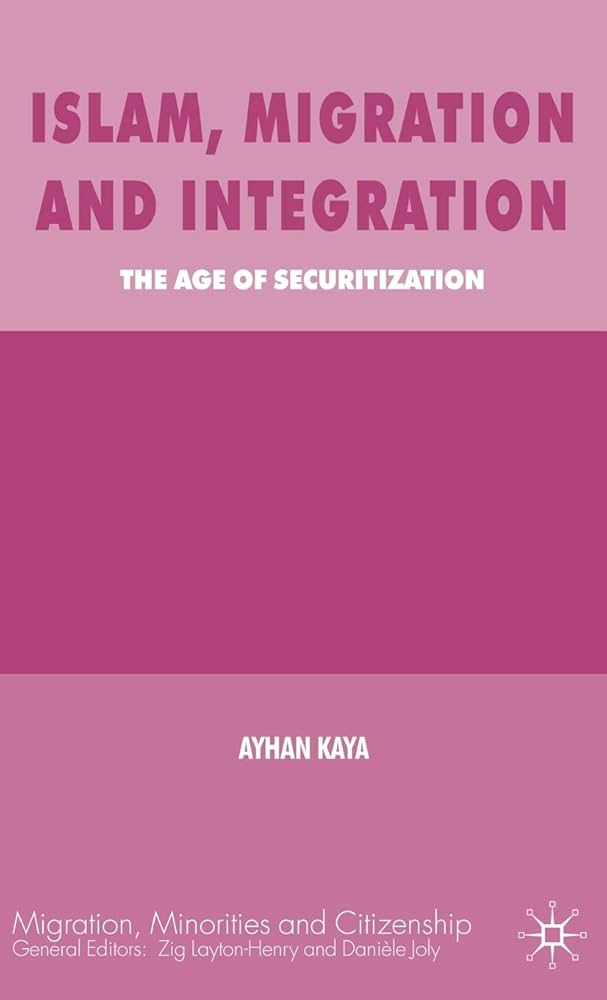Islam, Migration and Integration: The Age of Securitization – Ayhan Kaya

Author: Ayhan Kaya
Publisher: Palgrave Macmillan London
Year of Publication: 2009
Print Length: 273 pages
Genre: Non-Fiction / Cultural Studies, Non-Fiction / Ethnic Studies, Non-Fiction / Migration & Refugee Studies, Non-Fiction / Politics & Political Science, Non-Fiction / Religious Studies, Non-Fiction / Social Science, Non-Fiction / Sociology
Area: Belgium, Europe, France, Germany, The Netherlands
Topic: Assimilation, Community, Culture & Society, Diversity, Ethnic & Ethnicity, Integration, Islam, Islamic Studies / Theology, Ethics and Philosophy, Management, Migration, Multiculturalism, Politics & Power, Security
This work explores contemporary debates on migration and integration, focussing on Euro-Muslims. It critically engages with republicanist and multiculaturalist policies of integration and claims that integration means more than cultural and linguistic assimilation of migrant communities.
Table of Contents
List of Figures
List of Tables
List of Maps
Acknowledgements
Preface
Introduction
The overall socio-political context: the stigmatization of Islam
Securitization of migration as a form of governmentality: migrants as anti-citizens
Security sector: winners and losers
Fortress Europe: ultra-politics of symbols
Migrants in post-social state: from welfarism to prudentialism
Management of ethno-cultural and religious diversity
The scope of the study 36
1 Germany: from Segregation to Integration
Hyphenated citizenship: German-Turks
Anatomy of German-Turkish transnational space
Habitats of meaning for German-Turks
2 France: from Integration to Segregation
Stigmatization and statisticalization of illegal migrants
Weakening of Egalitarian Republican rhetoric
From assimilation to the Communautés
Crisis of French universalism: affaire des foulard
Banlieu riots: a quest for Republican resistance
Puissance: the power of collectivity
3 Belgium: a Culturally Divided Land
The migratory process in Belgium: From Gasterbeiders (guestworkers) to Vreemdelingen (foreigners)
Diverse understandings of citizenship
Integration of immigrants: Walloon and Flemish models
Attitudes towards foreigners
4 The Netherlands: from Multiculturalism to Assimilation
Pillarization (Verzuiling) and depillarization of Dutch society
Fifth column: Islam in the Netherlands
Muslims in the Netherlands: colonial legacy
Ethnic minority policy
Naar Netherlands (Coming to the Netherlands)
Structural outsiderism among Muslims
Dutch minority research industry
5 Building Communities: Comfort in Purity
Making and unmaking communities
‘Imported’ brides and bridegrooms: search for purity
Multiculturalism: a neo-colonial technique of governmentality
The failure of republicanism and multiculturalism
The need for political integration of migrants
6 Accommodation of Islam: Individualization vs.
Institutionalization
Religion and state in different countries
Euro-Islam: politics of honour
The individualization of Islam among younger generations
Religion as a tool for emancipation: portable Islam
The other side of the coin: institutionalization of Islam
Conclusion: Transnationalizing Integration
Transnationalizing integration
Notes
Bibliography
Index

Ayhan Kaya is political scientist at the Department of International Relations and the Director of the European Institute. He is a Professor of Politics and Jean and Jean Monnet Chair of European Politics of Interculturalism at the Department of International Relations, İstanbul Bilgi University and a member of the Science Academy, Turkey. He received his PhD and MA degrees at the University of Warwick, England. He is the principal investigator for the ERC project titled “Nativism, Islamophobism and Islamism in the Age of Populism: Culturalisation and Religionisation of what is Social, Economic and Political in Europe”.
Source: https://eustudies.bilgi.edu.tr/en/person/ayhan-kaya/
More from Ayhan Kaya in this library, click here.
